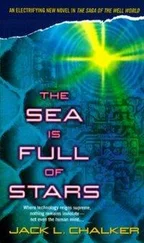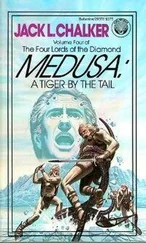Jack Chalker - Echoes of the Well of Souls
Здесь есть возможность читать онлайн «Jack Chalker - Echoes of the Well of Souls» весь текст электронной книги совершенно бесплатно (целиком полную версию без сокращений). В некоторых случаях можно слушать аудио, скачать через торрент в формате fb2 и присутствует краткое содержание. Год выпуска: 1993, ISBN: 1993, Издательство: Del Rey / Ballantine, Жанр: Фантастика и фэнтези, на английском языке. Описание произведения, (предисловие) а так же отзывы посетителей доступны на портале библиотеки ЛибКат.
- Название:Echoes of the Well of Souls
- Автор:
- Издательство:Del Rey / Ballantine
- Жанр:
- Год:1993
- ISBN:0-345-36201-2
- Рейтинг книги:3 / 5. Голосов: 1
-
Избранное:Добавить в избранное
- Отзывы:
-
Ваша оценка:
- 60
- 1
- 2
- 3
- 4
- 5
Echoes of the Well of Souls: краткое содержание, описание и аннотация
Предлагаем к чтению аннотацию, описание, краткое содержание или предисловие (зависит от того, что написал сам автор книги «Echoes of the Well of Souls»). Если вы не нашли необходимую информацию о книге — напишите в комментариях, мы постараемся отыскать её.
Echoes of the Well of Souls — читать онлайн бесплатно полную книгу (весь текст) целиком
Ниже представлен текст книги, разбитый по страницам. Система сохранения места последней прочитанной страницы, позволяет с удобством читать онлайн бесплатно книгу «Echoes of the Well of Souls», без необходимости каждый раз заново искать на чём Вы остановились. Поставьте закладку, и сможете в любой момент перейти на страницу, на которой закончили чтение.
Интервал:
Закладка:
“I’m afraid he’s right,” Terry agreed. “Listen, Doctor, if you feel it’s ridiculous to risk your life being with us, we can rig up something on the ground for you to join in the comments, but we have to be where the action is, risk or not. In this business you have to develop a kind of insanity, sort of like being a permanent teenager, taking risks and never thinking about the consequences. If not, we might as well stay in Atlanta and just cover the aftermath. We’re good at what we do, which is why so few of us get killed, but reporters do get hurt sometimes, even killed sometimes, in the pursuit of a story, and this is a major one. I thought that was understood. We’ll have a ton of very famous scientists back in Atlanta and around the country feeding stuff to the anchors from their safe offices in the States. You’re the one who’ll be on site. You have to think about that, and now.”
It was a sobering thought she hadn’t considered up to that point. There was risk in this, not the career risks and romantic risks she’d thought about before—those suddenly seemed very minor—but real risk to life and limb. As the meteor came in over the coast of west Africa, it would begin to burn and shatter, and pieces would begin to break off. Most would fall in the Atlantic, but by the time it reached the Brazilian coast, it would be quite low and quite hot and coming in incredibly fast. Those pieces would be raining down over an area perhaps hundreds of miles wide. Parts of the country would look as if they had been bombed by an enemy air force. Fortunately, the region was in the main lightly populated, although there would be some towns that would suffer. But if it cleared the Andes, it would rain over populous portions of Peru like a carpet bomb attack. And there was nowhere that was totally unpopulated anymore except most of Antarctica.
This could be a major disaster, and she was being taken right into the middle of it, as dangerously close as possible to get the right pictures.
She could die.
My God! No wonder they passed the buck to me!That probably was unfair, she told herself, but she still wouldn’t put it past them.
Of course, a lot of science was achieved at great risk. The geomorphologists who worked with exploding volcanoes took risks as a matter of routine; medicine and biology since well before the days of Madame Curie took risks as well. It could be a dangerous business, but it usually wasn’t. The last astronomer to take a risk greater than pneumonia from spending a long, cold night at the telescope was probably Galileo before the ecclesiastical court in Rome.
Of course, it would be easier if she really were here doing science, but she wasn’t. There were teams of top scientists all over the region doing that kind of work; with the level of prediction achieved by the computers on this event, it would probably be the most studied and viewed happening in contemporary science. She had no equipment, no labs waiting back home for her findings and samplings, no support at all. She was a mouthpiece, a witness for the cable TV audience.
Terry was getting a bunch of papers out of her briefcase. “Unless you want to bug out in Manaus, you’ll have to sign these,” the producer told her, shoving the papers over. “I have to fax signed copies back when I arrive and then Fedex the originals. It’s mostly standard stuff.”
She took the papers and started to look through them. The first was the personal release—she agreed that she had been told there was risk to this job and that she accepted the risk and wouldn’t sue the company if something happened, in exchange for which they’d cover all medical expenses from on-the-assignment injuries. The second was the general waiver and promise to abide by the rules of the corporation and do what she was asked to do, etc., etc. The third covered her under the group lawsuit insurance policy in case she said something on the air that somebody else didn’t like. The usual.
The fourth, however, was of more positive interest. It was basically a set of rules for an expense account for a foreign assignment, how to prepare one, what they would and would not cover, and the like. The list of what they covered was pretty damned extensive, but the rule apparently was to receipt everything and give it to Terry before, a certain cutoff date. And finally, there was an agreement that she would work for up to seven days on this assignment as their exclusive agent and on-camera representative as a free-lance commentator, and licensed unlimited use of any and all footage and commentary given during that period for the onetime fee of—my heavens! That was hundreds of dollars per day!
“You look surprised,” Terry noted.
“I—I never expected to be paid for this.”
“You aren’t plugging a book, you haven’t got a forthcoming PBS series or whatever, so you’re hired as a freelancer. Just remember that your fee is based on doing satisfactory work and I’m the one who decides if you do.”
Lori sighed. She knew at that point that even if she wasn’t being paid a dime she’d have to see it through, grit her teeth and go through with the whole thing. Very dangerous or not, this was the chance of a lifetime, the potential turning point in her life she’d abandoned all hope of ever getting.
“I’m in,” she told the producer.
Amazonia: Rockfall Minus One
Manaus lay so far into the Amazonian interior of Brazil that since its founding, its major connection to the rest of Brazil and the world as well had been just the Amazon River. Although now it was possible to reach the city by road, the river and the airplane were the primary twin connectors of the city to the rest of civilization.
Still, Manaus was a very large city, born during the boom in gold and other treasures of the Amazon discovered and developed in the nineteenth century. Great old houses and a magnificent if now rundown center city, with its old-world buildings defiant against the jungle, looking more like Lisbon at its finest, displayed Manaus’s past, and with the development of the interior in full swing, it was something of a boomtown again. Its airport, always vital since the founding of the national airline decades before, was as grand and modern as any in the western world and was the main port of entry for foreign airliners, almost as if Brazil were intent on reminding all its visitors that there was more to the country than Rio and Sao Paulo. There were first-class hotels here once more, with all the amenities of modern civilization, and in its bustling streets one could buy almost anything.
With a corporate credit card, it wasn’t hard for the two women to pick up what they needed, although it was a hardship to do so in the couple of hours allotted to the task. Terry had to be back at the hotel in a hurry; she’d been on the phone and fax in the hotel’s business center almost since arriving, and she still had much to do. By the time they returned, messages had piled up, and before heading back down to the business center, Terry told Lori to order from room service and unpack and repack as needed.
A bellman came up a few minutes later with a folder full of papers, and Lori looked them over after being told they were from Terry. They turned out to be faxes of the latest computer summaries, including maps and tracking data. It was now felt that the angle and velocity would not take the approaching meteor over the Andes, which was a relief to Peru and Ecuador, of course, but the projections also indicated it would track a bit north of the original estimates.
She grabbed a map of Brazil and did a plot. If the projections held up, it would luckily hit in one of the remotest and least populated areas left in the country, but that would also present new dangers. If anything happened and the news crew went down in that region, they might never be found.
Читать дальшеИнтервал:
Закладка:
Похожие книги на «Echoes of the Well of Souls»
Представляем Вашему вниманию похожие книги на «Echoes of the Well of Souls» списком для выбора. Мы отобрали схожую по названию и смыслу литературу в надежде предоставить читателям больше вариантов отыскать новые, интересные, ещё непрочитанные произведения.
Обсуждение, отзывы о книге «Echoes of the Well of Souls» и просто собственные мнения читателей. Оставьте ваши комментарии, напишите, что Вы думаете о произведении, его смысле или главных героях. Укажите что конкретно понравилось, а что нет, и почему Вы так считаете.












